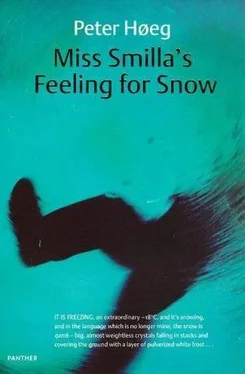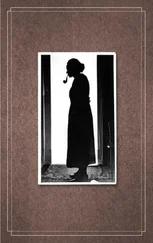Peter Høeg - Smilla's Sense of Snow aka Miss Smilla's Feeling for Snow
Здесь есть возможность читать онлайн «Peter Høeg - Smilla's Sense of Snow aka Miss Smilla's Feeling for Snow» весь текст электронной книги совершенно бесплатно (целиком полную версию без сокращений). В некоторых случаях можно слушать аудио, скачать через торрент в формате fb2 и присутствует краткое содержание. Жанр: Современная проза, на английском языке. Описание произведения, (предисловие) а так же отзывы посетителей доступны на портале библиотеки ЛибКат.
- Название:Smilla's Sense of Snow aka Miss Smilla's Feeling for Snow
- Автор:
- Жанр:
- Год:неизвестен
- ISBN:нет данных
- Рейтинг книги:3 / 5. Голосов: 1
-
Избранное:Добавить в избранное
- Отзывы:
-
Ваша оценка:
- 60
- 1
- 2
- 3
- 4
- 5
Smilla's Sense of Snow aka Miss Smilla's Feeling for Snow: краткое содержание, описание и аннотация
Предлагаем к чтению аннотацию, описание, краткое содержание или предисловие (зависит от того, что написал сам автор книги «Smilla's Sense of Snow aka Miss Smilla's Feeling for Snow»). Если вы не нашли необходимую информацию о книге — напишите в комментариях, мы постараемся отыскать её.
Smilla's Sense of Snow aka Miss Smilla's Feeling for Snow — читать онлайн бесплатно полную книгу (весь текст) целиком
Ниже представлен текст книги, разбитый по страницам. Система сохранения места последней прочитанной страницы, позволяет с удобством читать онлайн бесплатно книгу «Smilla's Sense of Snow aka Miss Smilla's Feeling for Snow», без необходимости каждый раз заново искать на чём Вы остановились. Поставьте закладку, и сможете в любой момент перейти на страницу, на которой закончили чтение.
Интервал:
Закладка:
There is no sadism in him. Merely a precise and perhaps faintly melancholy understanding of the instruments at his disposal.
There are no prisons in Greenland. The greatest difference in the administration of the law in Copenhagen and in Nuuk is that in Greenland the punishment is more often a fine for offenses which in Denmark would have resulted in imprisonment. The Greenlandic hell is not the European rocky landscape with pools of sulfur. The Greenlandic hell is the locked room. In my memories of my childhood it seemed as though we were never indoors. Living in the same place for a long time was unthinkable for my mother. I feel the same way about my spatial freedom as I've noticed men feel about their testicles. I cradle it like a baby, and worship it like a goddess.
I've reached the end of the road in my investigation of Isaiah's death.
We stand up. We haven't touched our cups. The tea has grown cold.
Part Two
The City
1
You can try to cover up depression in various ways. You can listen to Bach's compositions for the organ in Our Saviour's Church. You can arrange a line of good cheer in powder form on a pocket mirror with a razor blade and ingest it with a straw. You can call for help. For instance, by telephone, so that you know who's listening.
That's the European method. Hoping to work your way out of problems through action.
I take the Greenlandic way. It consists of submerging yourself in the dark mood. Putting your defeat under a microscope and dwelling on the sight.
When things are really bad-like now-I picture a black tunnel in front of me. I go up to it. I strip off my nice clothes, my underwear, my hard hat, my Danish passport, and then I walk into the dark.
I know that a train is coming. A lead-lined steam loconxotive transporting strontium 90. I go to meet it.
It's possible for me to do this because I'm thirty-seven years old. I know that inside the tunnel, underneath the wheels, down between the ties, there is a little spot of light.
It's the morning of Christmas Eve. For several days I've been gradually withdrawing from the world. Now I'm preparing for the final descent. Which has to come. Because I have allowed myself to be cowed by Ravn. Because I am failing Isaiah. Because I can't get my father out of my thoughts. Because I don't know what I'm going to say to the mechanic. Because it feels as if I'm never going to get any smarter.
I've prepared myself by not eating breakfast. That expedites the confrontation. I've locked the door. I sit down in the big chair. And invoke the bad mood: Here sits Smilla. Starving. In debt. The morning of Christmas Eve. While other people have their families, their sweethearts, their canaries. While other people have each other.
It proves effective. I'm already standing in front of the tunnel. Aging. A failure. Abandoned.
The doorbell rings. It's the mechanic. I can tell by the way he rings the bell. Cautiously, tentatively, as if the bell were screwed right into the skull of an old woman that he doesn't want to disturb. I haven't seen him since the funeral. Haven't wanted to think about him.
I go out and disconnect the bell. I sit down again. Internally I begin to evoke the images from the second time I ran away and Moritz came to get me in Thule. We were standing on the uncovered cement platform that you walk on for the last twenty yards out to the plane. My aunt was whimpering. I took as many deep breaths as I could. I thought this might be a way to take the clear, dry, somehow sweet air back to Denmark with me. Someone is knocking on my back door. It's Juliane. She gets down on her knees and calls through the mail slot. "Smilla, I'm making fish balls!"
"Leave me alone."
She's offended. "I'll pour the batter through your mail slot."
Right before we climbed the stairs into the plane, my aunt gave me a pair of kamiks to wear indoors. The beadwork alone had taken her a month.
The phone rings.
"There's something I would like to talk to you about." It's Elsa Lübing's voice.
"I'm sorry," I say. "Tell it to somebody else. Cast not thy pearls before swine."
I pull out the phone jack. I'm starting to feel rather attracted to the thought of Ravn's isolation cell. This is the kind of day when you wouldn't be surprised if someone started knocking on your windows. On the fifth floor.
Someone knocks on my window. Outside stands a green man. I open the window.
"I'm the window washer. I just wanted to warn you, so you don't go and take off your clothes."
He gives me a big smile. As if he were washing the windows by putting one pane at a time into his mouth. "What the hell do you mean? Are you implying that you don't want to see me nude?"
His smile fades. He pushes a button, and the platform he's standing on takes him out of reach.
"I don't want my windows washed," I shout after him. "At my age I can barely see out of them, anyway." During my first years in Denmark I didn't speak to Moritz. We ate dinner together. He had demanded that. Without uttering a word we would sit there rigidly, while successive housekeepers served successive dishes. Mrs. Mikkelsen, Dagny, Miss Holm, Boline Hsu. Rissole, hare in cream sauce, Japanese vegetables, Hungarian spaghetti. Without exchanging a single word.
When people talk about how fast children forget, how fast they forgive, how sensitive they are, I let it go in one ear and out the other. Children can remember and forget and totally freeze out the people they don't like.
I must have been about twelve before I understood even part of the reason why he had brought me to Denmark.
I had run away from the school in Charlottenlund. I was hitchhiking west. I had heard that if you headed west you would come to Jutland. Frederikshavn was in Jutland. From there you could go to Oslo. From Oslo freighters regularly departed for Nuuk.
Near Sorø, late in the afternoon, I got a lift from a forest ranger. He drove me to his home, gave me milk and sandwiches, and told me to wait a minute. While he was calling the police, I stood with my ear to the door.
Outside the garage I found his son's motorbike. I set out across the fields. The ranger chased after me, but his slippers got stuck in the mud.
It was wintertime. On a curve near a lake, I skidded and crashed and tore my jacket and scraped my hand. From there I walked for a large part of the night. I sat down to sleep in a shelter near a bus stop. When I woke up, I was sitting on a kitchen table, and a woman was disinfecting the scrapes on my ribs with rubbing alcohol. It felt as if I'd been knocked down by a pile driver.
At the hospital they picked the asphalt out of the wound and put a cast on my broken wrist bones. Then Moritz arrived to pick me up.
He was very angry. He was shaking as we walked side by side down the hospital corridor.
He was holding on to my arm. When he let go to take out his car keys, I took off. I was on my way to Oslo. But I wasn't in the best shape, and he has always been quick. Golf players jog in order to last the course, which is often two times sixteen miles if they play seventy-two holes in two days. He caught up with me in a flash.
I had a surprise for him. A surgical scalpel from the emergency room that I had hidden in my hood. They slice through flesh like butter that's been sitting in the sun. But because my right hand was in a cast, I only managed to give him a gash across the palm of one hand.
He looked at his hand, and then he raised it to hit me. But I had slipped back a bit, so we circled around each other there in the parking lot. If physical violence has haunted a human relationship for a long time, it's sometimes a relief to get it out in the open.
Suddenly he straightened up.
"You're just like your mother," he said. And then he started to cry.
Читать дальшеИнтервал:
Закладка:
Похожие книги на «Smilla's Sense of Snow aka Miss Smilla's Feeling for Snow»
Представляем Вашему вниманию похожие книги на «Smilla's Sense of Snow aka Miss Smilla's Feeling for Snow» списком для выбора. Мы отобрали схожую по названию и смыслу литературу в надежде предоставить читателям больше вариантов отыскать новые, интересные, ещё непрочитанные произведения.
Обсуждение, отзывы о книге «Smilla's Sense of Snow aka Miss Smilla's Feeling for Snow» и просто собственные мнения читателей. Оставьте ваши комментарии, напишите, что Вы думаете о произведении, его смысле или главных героях. Укажите что конкретно понравилось, а что нет, и почему Вы так считаете.




![Рута Шепетис - Ashes in the Snow [aka Between Shades of Gray]](/books/414915/ruta-shepetis-ashes-in-the-snow-aka-between-shades-thumb.webp)







